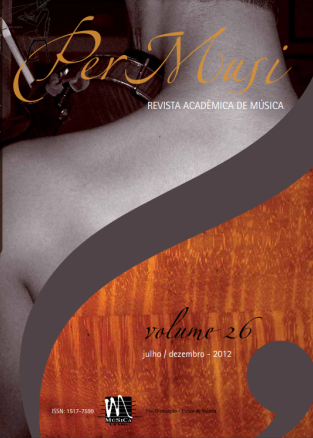A percepção de emoções em trechos de música ocidental erudita
Palavras-chave:
Emoções musicais, Percepção musical, Expertise musicalResumo
O objetivo deste estudo foi verificar respostas emocionais a trechos musicais do repertório erudito ocidental. Músicos e não músicos ouviam cada trecho musical e associavam-no a categorias emocionais (Alegria, Tristeza, Serenidade ou Medo/Raiva). Os resultados indicaram que, para ambos os grupos, cada trecho musical, na maioria, não foi associado a mais de uma categoria emocional. De um modo geral, as associações foram semelhantes entre os grupos, embora as respostas dos músicos tenham sido mais consistentes. Estes resultados sugerem um processamento cognitivo de respostas emocionais à música ocidental relacionado à estrutura cognitiva do evento, a diferenças entre indivíduos e à expertise musical.
Referências
BALKWILL, L. L.; THOMPSON, W. F. A cross-cultural investigation of the perception of emotion in music: psychophysical and cultural cues. Music Perception, v.17, n.1, p.43-64, 1999.
BERLYNE, D. The new experimental aesthetics: steps toward an objective psychology of aesthetics appreciation. Washington, D.C.: Hampshire, 1974.
BIGAND, E.; FILIPIC, S.; LALITTE, P. The time course of emotional response to music. Annals of the New Academic of Sciences, v.1060, p.429-437, 2006.
BIGAND, E.; POULIN-CHARRONAT, B. Are we all “experienced listeners”? Cognition, v.100, n. 1, p.100-130, 2006.
BIGAND, E.; VIEILLARD, S.; MADURELL, F.; MAROZEAU, J.; DACQUET, A. Multidimensional scaling of emotional responses to music: the effect of musical expertise and of the duration of the excerpts. Cognition and Emotion, v.19, n.8, p.1113-1139, 2005.
COCENAS-SILVA, R.; BUENO, J. L. O.; MOLIN, P.; BIGAND, E. Multidimensional scaling of musical time estimations. Perceptual and Motor Skills, v.112, p.737-748, 2011.
DALLA BELLA, S.; PERETZ, I.; ROUSSEAU, L.; GOSSELIN, N.; AYOTTE, J.; LAVOIE, A. Development of the happy-sad distinction in music appreciation – Does tempo emerge earlier than mode? Annals of New York Academy of Sciences, v.930, p.436-438, 2001.
GABRIELSSON, A.; JUSLIN, P. Emotional expression in music. In DAVIDSON, R. J.; K. R. SCHERER; H. H. GOLDSMITH (Eds.). Handbook of Affective Sciences. New York: Oxford University Press, p.503-534, 2003.
GABRIELSSON A.; LINDSTRÖM, E. The influence of musical structure on emotional expression. IN: JUSLIN, P. N.; SLOBODA, J. J. (Eds.). Music and emotion: theory and research. New York: Oxford University Press, p.223-248, 2001.
GALVÃO, A. Cognição, emoção e expertise musical. Psicologia: Teoria e Pesquisa, v. 22, n. 2, p.169-174, 2006.
HARGREAVES, D.; CASTELL, K. C. Development of liking for familiar and unfamiliar melodies. In: INTERNATIONAL SEMINAR OF THE INTERNATIONAL SOCIETY FOR
MUSIC EDUCATION, 11. 1986, Frankfurt, Germany. Paper presented at the Eleventh International Seminar of the International Society for Music Education. Frankfurt, Germany, 1986.
HEVNER, K. Expression in music: a discussion of experimental studies and theories. Psychological Review, v.42, p.186-204, 1935.
HEVNER, K. Experimental studies of the elements of expression in music. American Journal of Psychology, v.48, p.246-268, 1936.
HEYDUCK, R. G. Rated preference for musical composition as it relates to complexity and exposure frequency. Perception and Psychophysics, n.17, p.84-91, 1975.
JØRGENSEN, H. The psychology of the music experience. Oslo: Norsk Musikforlag, 1988.
JUSLIN, P.; LAUKKA, P. Expression, perception and induction of musical emotions: a review and a questionnaire study of everyday listening. Journal of New Music Research, v.33, n.3, p.217-238, 2004.
KOELSCH, S.; GUNTER, T.; FRIEDERICI, A. D.; SCHRÖEGER, E. S. Brain indices of music processing: ‘nonmusicians’ are musical. Journal of Cognitive Neurosciences, v.12, p.520-541, 2000.
LARSEN, J. T; DIENER, E. Promisses and problems with the circumplex model of emotion. In: CLARKE, M. S. (Ed.). Review of personality and Social Psychology. Newbury Park: Sarge, 1992, v.14, p.25-59.
RAMOS, D.; BUENO, J. L. O.; BIGAND, E. Manipulating ecclesiastic musical modes and tempo results in continuous changes in perceived musical emotion along arousal and valence dimensions. Brazilian Journal of Biological and Medical Research, v.44, p.106-114, 2011.
ROBINSON, J. Music and meaning. Ithaca, NY: Cornell University Press, 1997.
ROBAZZA, C.; MACALUSO, C.; D’URSO, V. Emotional reactions to music by gender, age and expertise. Perceptual and Motors Skills, v.79, p.939-944, 1994.
RUSSEL, P. A. Affective space is bipolar. Journal of Personality and Social Psychology, v.37, p.345-356, 1979.
RUSSEL, P. A. A circumplex model of affect. Journal of Personality and Social Psychobiology, v.39, p.1161-1178, 1980.
SCHERER, K. R.; ZENTNER, M. R. Emotional effects of music: production rules. In: JUSLIN, P. N.; SLOBODA, J. A. (Eds.). Music and emotion: theory and research. New York: Oxford University Press, 2001, p.361-392.
SLOBODA, J.; JUSLIN, P. Music and emotion: theory and research. New York: Oxford University Press, 2001.
WATERMAN, M. Emotional responses to music: implicit and explicit effects in listeners and performers. Psychology of Music, v.24, p.53-67, 1996.
Downloads
Publicado
Edição
Seção
Licença

Este trabalho está licenciado sob uma licença Creative Commons Attribution 4.0 International License.

Exceto onde está indicado, o conteúdo neste site está sob uma Licença Creative Commons - Atribuição 4.0 Internacional.












